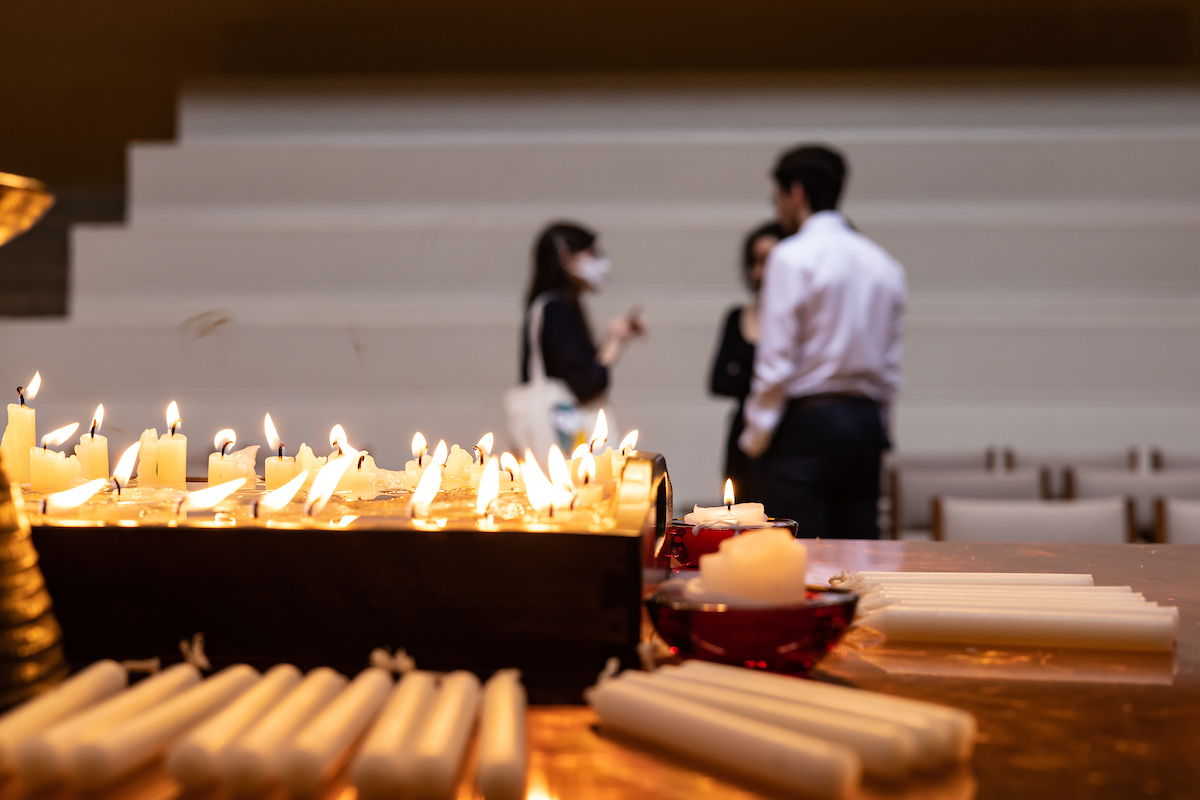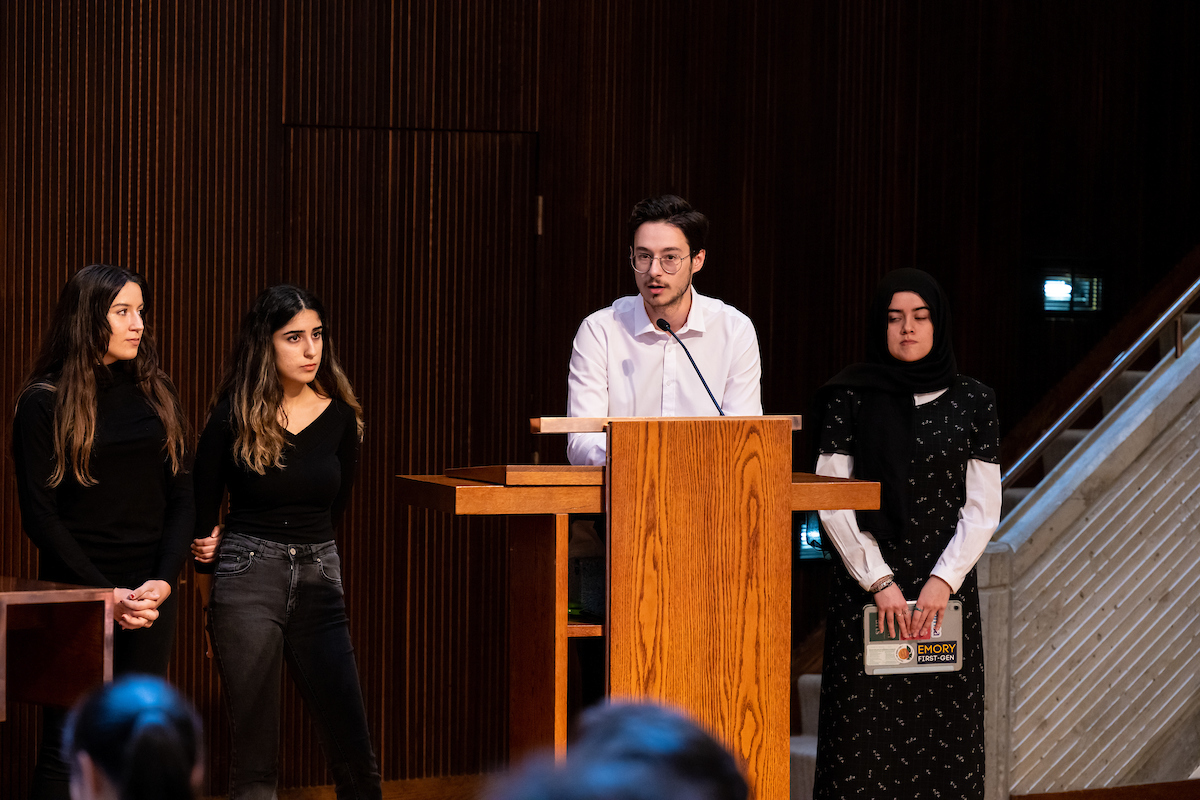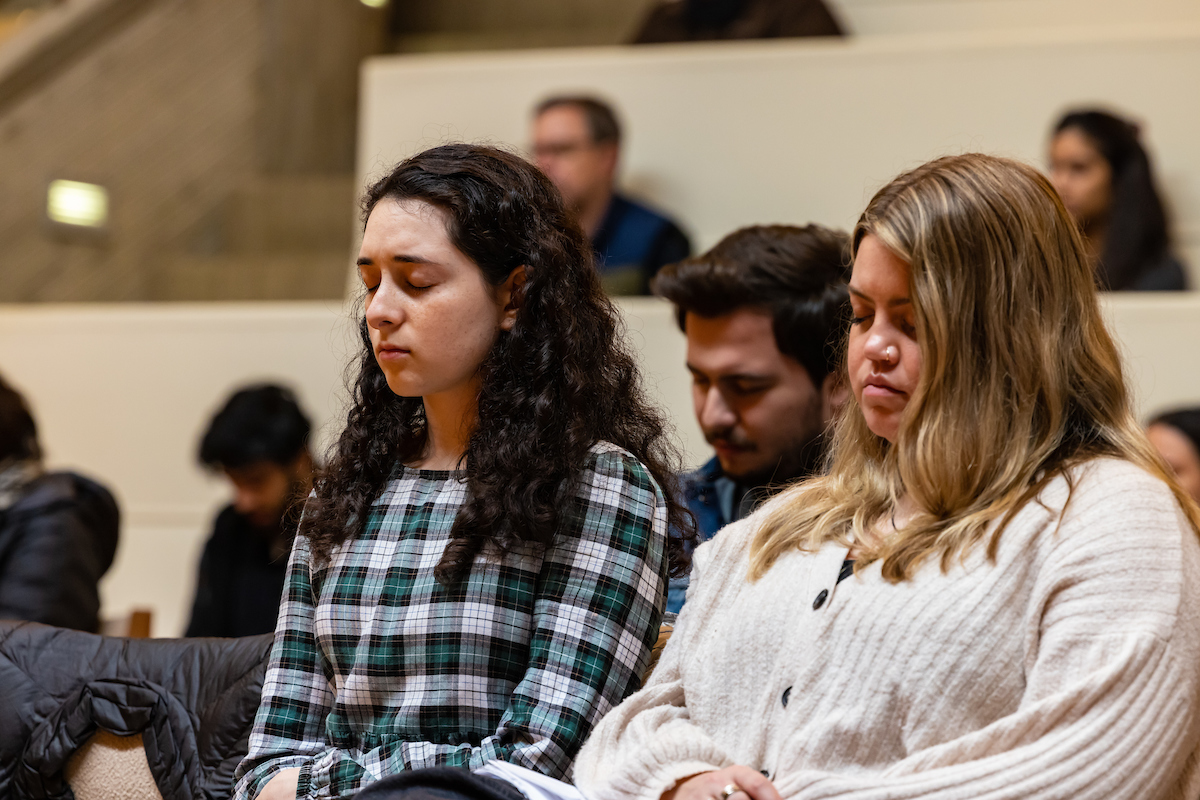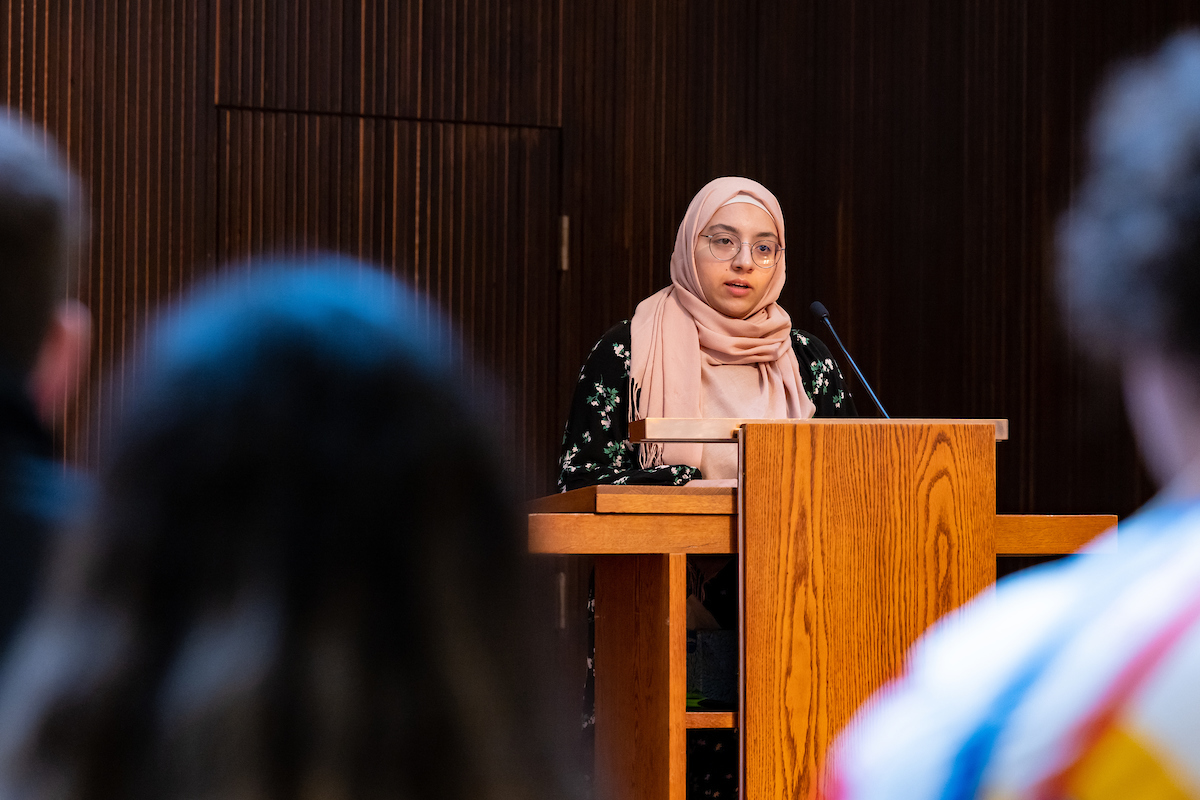A crowd of about 80 Emory community members gathered into Cannon Chapel on Wednesday, Feb. 15, seeking respite from the rain and comfort in togetherness while honoring lives lost to the recent earthquakes in Turkey and Syria. Members from all corners of the Emory community attended, sharing their connections to the area and resources for support.
The Reverend Dr. Gregory W. McGonigle, dean of religious life and university chaplain, welcomed attendees and reiterated what happened: Just after 4 a.m. on Monday, Feb. 6, a 7.8 magnitude earthquake struck southern and central Turkey as well as northern and western Syria. Nine hours later, a second, 7.5 magnitude earthquake struck.
McGonigle then shared a poem by the Unitarian Universalist minister Rev. Julia Hamilton, part of which read: Let us turn our hearts toward those impacted by the earthquake in Turkey and Syria: What a terrible thing it is, when the earth leaps out from under your feet, When the buildings tremble and fall in the morning dark, When we are reminded of just how precarious our lives are on this thin crust Floating above the massive force of the molten core of this planet we share. May those who are suffering this day find some measure of peace. May the search and rescue teams be strengthened as they search for every beating heart in the rubble, and as they tenderly recover those lost.
The opening speaker was Didem Uca, assistant professor of German studies and associated faculty with Middle Eastern and South Asian studies and women’s, gender and sexuality studies. “Over the past week and a half, we’ve watched in horror as people we love have suffered and places we love have turned to dust,” Uca said. A dual citizen, she lived and taught in Gaziantep, Turkey, in 2011-2012, which is near the epicenter of the disaster.
Uca recalled when she first learned the Turkish word for earthquake, “deprem,” in 1999 after a 7.6 magnitude earthquake in Turkey killed 18,000 people and caused many of her relatives to lose their homes. “I remember thinking that ‘deprem’ sounded like ‘depression.’ How fitting, given the heavy sadness with which this word is weighted, symbolizing the pain we have felt without relief since last week,” she said.
Students Bahar Agu and Ilayda Baykan shared their stories, along with students Giray Yilmaz and Elif Gencer from Turkey who are working to raise money to benefit the Turkish Philanthropy Funds (TPF), also shared their stories. “The lack of media attention to the cause [earthquake relief efforts] can make us feel that we’re alone. But seeing how much Emory cares makes me really proud to be an Emory student,” Yilmaz said.
“The best thing we can do is be in solidarity and support each other in the best ways we can,” Gencer added. “I cannot emphasize how much donations matter at this point.”
Adina Peck and Jasmine Mahadumrongkul, two Inter-Religious Council representatives, offered readings. Peck read from Psalms, in both Hebrew and English; Mahadumrongkul asked attendees to close their eyes, center attention on their breath, and send good intentions to the victims of the earthquake while she read the Buddhist discourse on loving-kindness. Naji Algaal, Emory Muslim Student Association and Inter-Religious Council representative, shared remarks and read several lines from a work by Syrian poet Hudaifah Al-a’arjy.
Muhammad Erchid, president of the Graduate Muslim Student Council, reflected on the videos of people in Turkey and Syria — those joining together to serve and those being pulled out of rubble and praising God — and remembered the lessons in the Qur’an about tests of life and lessons through suffering. Muslim Student Association member Osama Hussein shared a Qur’anic recitation and member Tasneem Ahmad shared an Islamic supplication.
About 80 Emory community members attended the event in Cannon Chapel.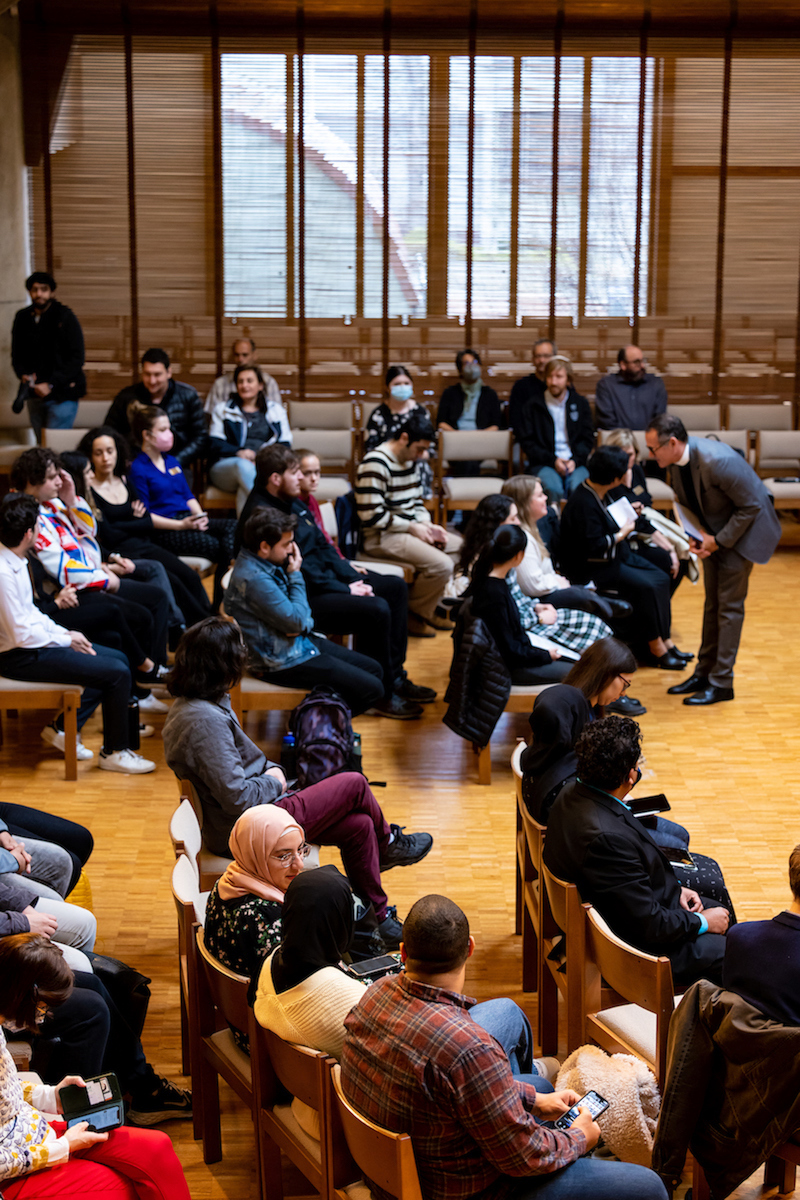
After the candles were lit, Kemal Budak, visiting associate professor and PhD student in the Department of Sociology, offered a slightly different perspective. He shared the four stages that generally result from such tragedies: shock, anger, reconciliation and restoration.
“While I am from the other side of Turkey, many of my friends and their relatives are still under the rubble. It’s hard to say a few words in the face of those tragedies,” he said.
Although the continued devastation in Syria and Turkey is weighing heavily on everyone’s minds, sharing the grief in community with one another seemed to make each individual burden slightly more bearable. The program concluded with a sharing of resources, listed below, and was followed by a reception in which members of Emory’s Turkish community of faculty, staff and students were able to connect with one another, and others in the community were able to offer their support.
Student resources:
- Counseling and Psychological Services (CAPS) provides individual, group and couples counseling; stress management classes; and community outreach to provide support for students on the Atlanta and Oxford campuses and assist them in negotiating emotional and interpersonal difficulties. CAPS on-call counselors are available Monday-Friday, 8:30 a.m. to 3:30 p.m. Atlanta campus: 404-727-7450. Oxford campus: 770-784-8394.
- TimelyCare is a 24-hours a day, 7 days a week (24/7) virtual care service available from nearly anywhere for all enrolled Emory students. Sign up using your Emory email address. Once there, you may schedule a session with a health care provider. TalkNow, a part of TimelyCare, is a free on-demand 24/7 resource for immediate access to a mental health professional.
- Student Case Management and Intervention Services (SCMIS) provides support for basic needs, follow up care, and other resources. If you are concerned about a student (non-urgent), please submit a Student of Concern form and SCMIS will follow up with the student.
- Student Intervention Services (SIS) assists students in times of crises, not only as an invaluable resource during emergencies, but also as a source of impartial, judgment-free counsel for students seeking guidance and assistance through life’s difficult times. 404-430-1120.
- Student Health Services (SHS) offers free psychiatric services for all enrolled Emory students. Services include diagnostic psychiatric evaluations, medication evaluations, long-term management of psychiatric medications and community referrals. For guidance for after-hours emergencies, visit the SHS Emergency Care / After Hours web page. Atlanta campus: 404-727-7551. Oxford campus: 770-784-8376.
- Office of Spiritual and Religious Life offers worship, prayer, meditation, and support through spiritual communities, educational programs, confidential pastoral care, and connections with service and social justice efforts. We also plan vigils and other rituals with students, faculty and staff. Atlanta campus website. Oxford campus website
- For additional well-being resources or information, please visit the Be Well, Your Way hub at studentwellbeing.emory.edu.
Faculty and staff resources:
- Faculty Staff Assistance Program (FSAP) provides free and confidential support for employees and benefits-eligible Emory University employees and family members. Services include individual, couples and family counseling, coaching and consultation, and individual or team crisis support. Daytime emergency appointments and on-call after-hours support are available. Visit the emergency services webpage or call 404-727-9355 (WELL). You can also utilize the FSAP online self-assessments to see how you are doing or scheduled a virtual well-being check-in with a licensed mental health professional.
- Office of Spiritual and Religious Life offers worship, prayer, meditation and support through spiritual communities, educational programs, confidential pastoral care and connections with service and social justice efforts. We also plan vigils and other rituals with students, faculty and staff. Atlanta campus website. Oxford campus website.
- BHS: Emory Healthcare has partnered with https://portal.bhsonline.com to provide EHC employees and your household members with confidential, in-the-moment support to help with personal or professional problems that may interfere with work or family responsibilities. This program is free and available at no cost to you. Services are available 24-hours a day, 7-days a week. Call/text 1-800-327-2251 or visit the MyBHS portal (username: EHC).
- EmBRACE Peer Support: Emory’s Building Resilience and Compassion Enculturation (emBRACE) Peer Support Program is an interprofessional, systems approach to decrease the burdens of secondary trauma and moral distress experienced by Emory Healthcare and Woodruff Health Sciences Center employees. Trained peer supporters include physicians, nurses, advanced practice providers, chaplains, social workers and other essential staff members. To be partnered with a Peer Supporter, please email embracepeersupport@emoryhealthcare.org.
- Spiritual Health: Emory Spiritual Health embraces the traditional religious care provided by professional health care chaplains, but also expands to include spiritual and cultural qualities associated with whole person health. Team members come alongside patients, family members and Emory Healthcare staff who are coping with health and work-related distress. Never hesitate to reach out to a “Blue Coat” from Emory Spiritual Health. Staff support contact information is available here.
Photos by Sarah Woods, Emory Photo/Video


